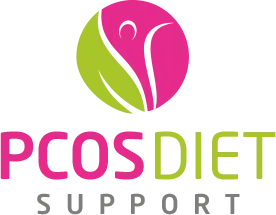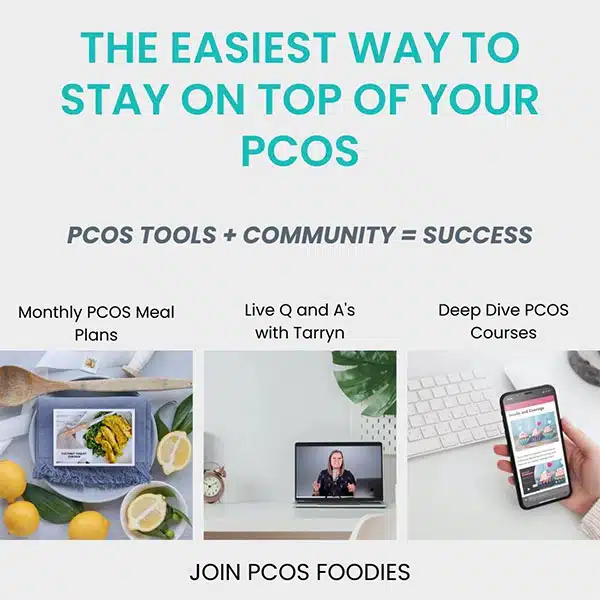What is The Best PCOS Diet?
This post was updated in May 2022
The research shows that dietary and lifestyle changes are one of the most important ways to manage PCOS. As a PCOS nutrition coach, I have spent the last 8 years answering the question, “What is the best diet for PCOS?”
The best diet for PCOS is one that is dairy and gluten-free and focuses on whole foods to manage the underlying hormonal imbalance associated with Polycystic Ovarian Syndrome. A diet higher in fats and proteins with some carbohydrates can help to manage the symptoms of PCOS.
So, we know that diet is crucial to managing PCOS and we’re going to get into it in a lot more detail on what you should and shouldn’t be eating, and I will also give you an idea of a sample PCOS diet plan. But first we need to understand WHY diet is so crucial.
How does my diet affect my PCOS?
Changing the way that you eat is one of the most important things you can do to manage your PCOS. You see, you have the ability to get to the heart of the problem, your hormones, simply by changing the way that you eat.
Insulin and PCOS
Although researchers are not sure what causes PCOS, they have found that there is a fundamental change in the Beta cells of the pancreas (2). What this means is that our bodies tend to over-respond to any glucose in our blood stream, causing a release of too much insulin.

So, management of blood insulin levels is crucial in the management of PCOS. Refined carbohydrates cause a spike in insulin levels and should therefore be avoided.
Many doctors will recommend a low GI diet of wholegrain, unprocessed foods in the management of PCOS. Metformin is also a drug commonly prescribed for women with PCOS, in an attempt to tackle insulin resistance.
Also, if you are insulin resistant and you don’t get your insulin levels under control, it could lead to higher than normal blood sugar levels with could result in type 2 diabetes.
BUT, insulin is not the only hormone impacted by PCOS. If it were, we’d all have been diagnosed with Type 2 Diabetes, which we have not. So, our diets need to incorporate low GI foods to manage insulin levels, in addition to tackling other aspects of the Polycystic Ovarian SYNDROME.
But, there is more…
Insulin, Androgens and PCOS
We know that a lot of the unpleasant symptoms of PCOS – hirsutism, infertility, acne – are caused by higher-than-normal levels of androgens or testosterone in our bodies. But why? Where do these high androgens come from?
Well, our ovaries produce androgens (this is normal for every women). But, in PCOS, our ovaries are too sensitive to insulin and this causes them to produce too much testosterone.
But do you see how insulin is the key to managing high levels of androgens? Anything we can do to improve our body’s insulin sensitivity will also help to improve all of our symptoms.
So, we can manage both our insulin and our testosterone by following a good PCOS diet.
What does the research say about a diet plan for PCOS?

Changing your diet should be the first thing that you do when you are diagnosed with PCOS. Unfortunately, not many doctors talk about this and they tend to prescribe medication first. And although you may see some improvements with medication, diet and lifestyle changes will be more effective (and you won’t need to take medication everyday for the rest of your life!)
Okay, so I have hopefully convinced you of the power of a good PCOS diet in managing your PCOS and it’s symptoms. Now I’m sure you must be wondering what on earth a diet plan for looks like and what you should be eating.
Let’s talk about it!
What are the Best Foods for PCOS?
Whole foods
Whole foods are foods that are as natural and unprocessed as possible. They are rich in fibre and take longer for the body to metabolise and break them down (they have a lower glycemic load). This means that they are absorbed more slowly into the blood stream and you need less insulin to deal with them. Remember, less insulin means less testosterone.
Examples of whole foods
Fish, meat, vegetables, fruit, nuts and seeds, healthy oils
Foods with a low Glycemic Load
Foods with a low glycemic load are those foods that do not cause a big spike in insulin. They tend to be unprocessed, unrefined and rich in fibre and vitamins and minerals. Also, be careful of foods that have added sugars. This can unnecessarily increase the glycemic load of those foods.
Examples of foods with a low Glycemic Load
For examples of foods with a low glycemic load, why not check out this article from Harvard University?
Anti-inflammatory foods
Women with PCOS tend to have low levels of chronic inflammation. This makes us more resistant to insulin, chronically fatigued and prone to gaining weight (4).
While managing those insulin levels will help with inflammation, making sure that your PCOS diet is rich in anti-inflammatory foods will help too.
Examples of anti-inflammatory foods
Here are some examples of anti-inflammatory foods to incorporate into your PCOS diet:
- dark leafy greens, including kale and spinach
- blueberries, blackberries, and cherries
- dark red grapes
- nutrition-dense vegetables, such as broccoli and cauliflower
- beans and lentils
- green tea
- red wine, in moderation
- avocado and coconut
- olives
- extra virgin olive oil
- walnuts, pistachios, pine nuts, and almonds
- cold water fish, including salmon and sardines
- turmeric and cinnamon
- dark chocolate
- spices and herbs
Foods with Healthy Fats
For a long time we have been taught that fats are bad and that fats can make you fat. But healthy fats are such an important part of our diet. A lot of our hormones are made using fats, as well as the sheath that surrounds our nerves.
Fats are also great for helping you feel fuller for longer and can help to lower the glycemic load of foods.
So, look at including some more of these healthy fats into your diet:
- Avocados
- Dark Chocolate
- Whole Eggs
- Fatty Fish
- Nuts
- Chia Seeds
- Extra Virgin Olive Oil
- Coconuts and Coconut Oil
What foods should I avoid as part of my PCOS Diet?
Dairy

The problem is that it also mimics insulin in the body. And remember, the more insulin we have, the more testosterone we also have, making our PCOS symptoms worse.
The only exception I have for the dairy rule is that I still have butter as it is high in good fats and vitamins we struggle to get elsewhere. Also, the dairy content is fairly low.
Examples of dairy alternatives
Rice milk, almond milk, oat milk, coconut milk
I suggest that you try a number of varieties and see which one you like the best.
Gluten
Gluten tends to create general inflammation in the body. Remember, the more inflammation we have, the more resistant we are to insulin and therefore the more testosterone we have floating around our bodies.
Now, before you rush off to the gluten free aisle, just a word of caution. Gluten free products tend to be highly refined and will have a high glycemic load, causing an insulin spike. So, I don’t recommend gluten free pastas, breads, treats, etc.
Soy
Soy products have been shown to delay ovulation in some women. And as we already struggle with ovulation already, I don’t recommend soy products for women with PCOS as it just exacerbates the problem. Soy and PCOS just don’t mix.
Okay, so having looked at all of that, you may be wondering what on earth you’re actually going to be able to eat.
Let’s have a look at a sample PCOS meal plan.
What does a sample PCOS diet plan look like?
Before we get in to this, I want to encourage you that there are so many incredible foods out there and it won’t be long before your cravings subside, you feel better in yourself and you’re loving your new way of eating.
Here are some ideas for each meal of the day:
Breakfast
There are some wonderful breakfast options, including:
- Green smoothies made with avocado, spinach, almond butter, apple and some fresh berries
- Eggs and bacon or boiled egg and avocado
- Grain free granola
Lunch
For lunch, I avoid sandwiches and instead opt for:
- Salads
- Soups
- Leftovers
Dinner
Dinner is normally pretty simple:
- Chicken thighs with sweet potato wedges and roasted veggies
- Sausages, sweet potato mash and veggies
- Salmon, steamed baby potatoes and a salad.
I also have 2 kids and we all tend to eat together so they have whatever we’re eating.
How do I get started on a PCOS Diet?
Here is the thing. We have PCOS for life (it’s not going to go away and there simply is no cure). This means that whatever we do, we need to make sure that we are making long lasting sustainable changes.
So, I would suggest that you start off with one meal. If you normally have cereal with milk for breakfast, try to make it more PCOS friendly. Once you feel comfortable with your breakfasts, move onto lunch and then to dinner.
However, you do it, start taking small manageable steps to eating better for your PCOS.
One of the best ways to get started with the PCOS diet is with the most advanced, dynamic meal planning platform, specifically for women with PCOS. It’s called PCOS Foodies and I think you should really check it out!
How long after changing my diet will I see improvements in my PCOS symptoms?

I have some more resources to help you get started in PCOS Foodies, including meal plans, supplements guide and deep dive courses. Why not check it out here?
- sustainable pcos weight loss strategies
- Over 5500 women have done it and seen results
- [bonus] Done for you pcos meal plans
- [bonus] intermittent fasting for pcos course
- [BONUS] personalised nutrition plan
JOIN OVER 5,500 OTHERS



